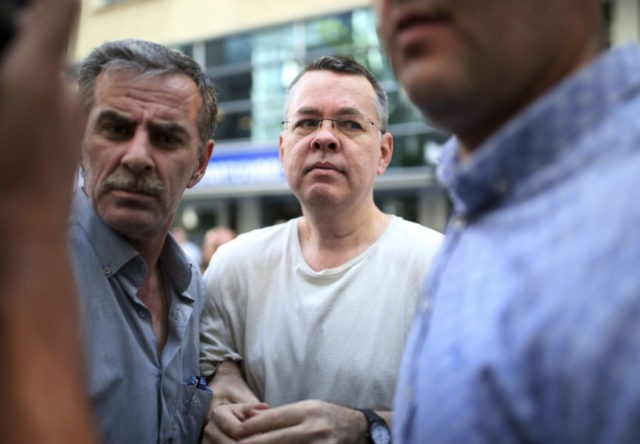Turkish Presidency Communications Director Fahrettin Altun on Thursday called U.S. sanctions on the nation for its continued arrest of American pastor Andrew Brunson an “economic coup attempt” against the government of President Recep Tayyip Erdoğan.
Turkish officials have taken to calling the sanctions, which target the leaders of the nation’s judiciary, attacks in an “economic war” between Turkey and the United States.
Erdoğan previously suffered a military coup attempt against his government in July 2016, which he blames on Pennsylvania-based Islamic cleric Fethullah Gülen. Gülen has denied any involvement in the coup, and American officials have repeatedly stated that Turkish law enforcement has not provided sufficient evidence against Gülen to trigger extradition. Brunson was arrested in late 2016 on charges of working as a spy for Gülen and the Marxist Kurdistan Workers’ Party (PKK) terrorist group. Brunson has denied the charges and Washington has stood by him, demanding his release.
Altun appeared to be attempting to calm the Turkish people following a decline in the value of the Turkish lira exacerbated by U.S. sanctions. In a tweet Thursday, he wrote, “With the acumen of our nation and the leadership of our president, we are fending off this economic coup attempt. This dear nation will remember both those who stand with and against it in this process.” The Hurriyet newspaper notes that Industry and Technology Minister Mustafa Varank issued a similar statement referring to “financial attacks,” without specifying the actions to which he was referring.
The United States Treasury Department sanctioned Turkish Minister of Justice Abdulhamit Gul and Minister of Interior Suleyman Soylu on August 1 for their roles in Brunson’s detention. The sanctions freeze any existing assets under their names in the United States and prevent U.S. citizens from generally doing business with them. Gul and Soylu both responded to the sanctions by dismissing them and claiming they have no economic ties to the United States, but international markets responded with pessimism to the news.
Erdoğan responded with tariffs. On Wednesday, a presidential decree read that new tariffs would make American “rice, tobacco products, vehicles, alcohol, coal, and cosmetics” more expensive to buy in Turkey. The president also doubled existing tariffs on American cars.
Erdoğan has also threatened a full boycott on American electronics, particularly the iPhone.
The Trump administration responded to the tariffs Wednesday by stating it would consider ending existing sanctions on Turkey only once Brunson is released. Brunson is currently being held on house arrest, moved there last month after a significant decline in his health in prison.
While the Turkish lira suffered a value drop following the imposition of sanctions, it has somewhat rebounded after Qatar announced it would invest $15 billion into Turkey’s economy to help offset the damage caused.
The U.S. State Department has responded to accusations of “economic war” by noting that Turkey’s economy was suffering long before the Brunson sanctions. Speaking at a regular press briefing Wednesday, State Department spokeswoman Heather Nauert refused to accept blame on the United States for any economic hardship that Turkey may currently be suffering
“In terms of the financial situation in Turkey, we addressed this yesterday, and Turkey’s financial situation has been in the works for quite some time and it dates prior to the imposition of sanctions on August,” she told reporters. “So this has been in train for quite some time and you cannot blame the U.S. Government for that.”
“The financial situation in Turkey had been in train, in process prior to the imposition of sanctions on the part of the United States Government, okay,” she repeated.
During his first term as prime minister, Erdoğan campaigned on free market, fiscally conservative policies that greatly improved the Turkish economy. As his Justice and Development Party (AKP) shifted its focus from economic freedom to Islamism, however, the Turkish economy began to suffer. Turkey’s first major economic hurdle was its growing presence in the Syrian civil war, which pit Ankara against close economic partner Russia. In 2015, Turkey lost significant Russian tourism revenue after it downed a Russian jet on the Turkey-Syria border.
2016 proved to be an especially bad year for the Turkish economy following multiple Islamic State attacks – including one at Istanbul’s Atatürk Airport – and the failed coup against Erdoğan. The year ended with the New Year’s Eve terror attack at the Reina nightclub in Istanbul, which largely catered to foreign tourists.
Nauert added during Wednesday’s briefing that “the diplomacy continues” with Turkey and that “we will be talking with the Turkish Government at some point in the future about the case of Pastor Brunson and the case of other Americans.”

COMMENTS
Please let us know if you're having issues with commenting.